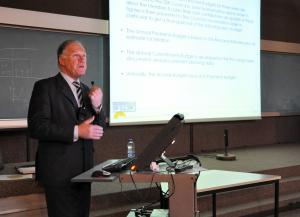Money talks
4 Feb 2011
-
Krista Dulon
"The ITER Organization is spending taxpayers' money and has to maintain a high level of efficiency, economy and integrity for all its expenditures," says Hans Spoor, head of ITER Finance & Budget.
Why was it necessary to invent the ITER Unit of Account, or IUA? What is the difference between the planned value of ITER and its actual cost? Does ITER earn interest on the funds it holds, and —if so—where does this money go?
Hans Spoor, Head of Finance & Budget, addressed these questions and more at this week's Inside ITER seminar. Entitled "Everything you wanted to know but were afraid to ask about ITER finances," the audience was introduced to the specificities of ITER financing by its Members, budget planning and procedures, and principles of ITER accounting.
ITER construction will be managed within an agreed capped ceiling of 4700 kIUA. "Converted to euros at 2010 conversion rates (1 IUA = 1,552.24 euros), that's EUR 7.3 billion," demonstrated Hans. "ITER construction costs are equivalent to less than 20 euro cents/year for the inhabitants of the ITER Member countries."


